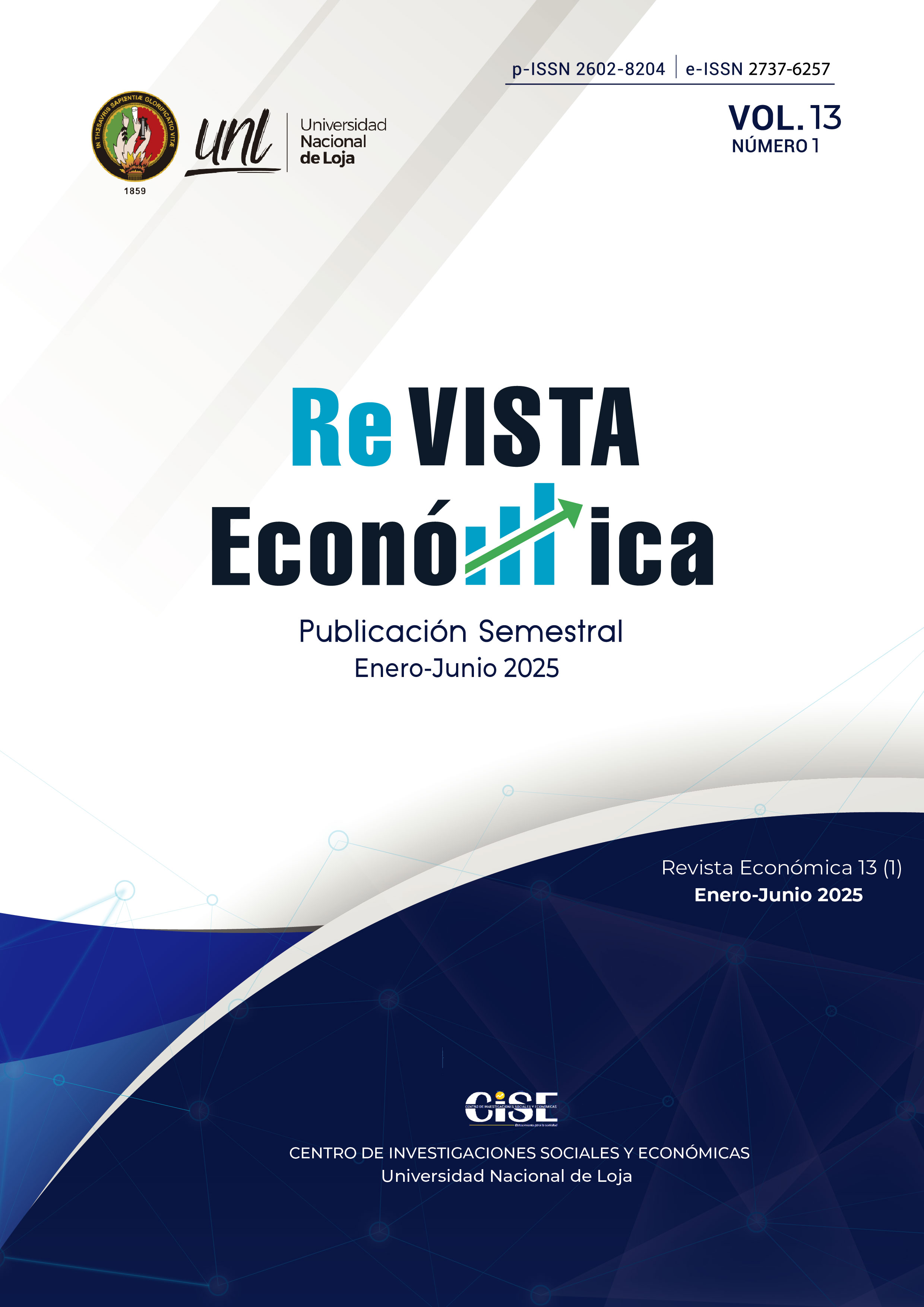A statistical approach to the analysis of manufacturing productivity and its relationship with wages in Mexico
Main Article Content
Abstract
Article Details

This work is licensed under a Creative Commons Attribution-NonCommercial-NoDerivatives 4.0 International License.
Esta obra está sujeta a la licencia Reconocimiento-NoComercial-SinObraDerivada 4.0 Internacional de Creative
Commons. Para ver una copia de esta licencia, visite http://creativecommons.org/licenses/by-nc-nd/4.0/.
References
Benešová, A., & Tupa, J. (2017). Requirements for education and qualification of people in industry 4.0. Procedia Manufacturing, 11, 2195–2202. Obtenido de https://www.sciencedirect.com/science/article/pii/S2351978917305747
Bensusán, G. (2017). Nuevas tendencias en el empleo: retos y opciones para las regulaciones y políticas del mercado de trabajo. En G. Bensusán, W. Eichhorst, & J. M. Rodríguez, Las transformaciones tecnológicas y sus desafíos para el empleo, las relaciones laborales y la identificación de la demanda de cualificaciones (págs. 81-179). Santiago de Chile: CEPAL. Obtenido de https://repositorio.cepal.org/server/api/core/bitstreams/7037538c-3cf0-430f-8e10-b4cb4872c254/content
Carrillo, J., Gomis, R., De los Santos, S., Covarrubias, L., & Matus, M. (2020). ¿Podrán transitar los ingenieros a la Industria 4.0? Análisis industrial en Baja California. Entreciencias: Diálogos en la Sociedad del Conocimiento, 8(22), 1-22. doi:https://doi.org/10.22201/enesl.20078064e.2020.22.76089
Eichhorst, W. (2017). Las instituciones del mercado laboral y el futuro del trabajo: ¿buenos empleos para todos? En G. Bensusán, W. Eichhorst, & J. M. Rodríguez, Las transformaciones tecnológicas y sus desafíos para el empleo, las relaciones laborales y la identificación de la demanda de cualificaciones (págs. 11-30). Santiago de Chile: CEPAL. Obtenido de https://repositorio.cepal.org/server/api/core/bitstreams/7037538c-3cf0-430f-8e10-b4cb4872c254/content
Frey, C. B., & Osborne, M. A. (2017). The future of employment: how susceptible are jobs to computerisation? Technological forecasting and social change, 114, 254-280. doi:https://doi.org/10.1016/j.techfore.2016.08.019
Gomez, F., Mac-Auliffe, R., & Rosselot, S. (2014). Brecha productividad–salario: Un acercamiento por rama. Estudios Nueva Economía, 3(1), 44–49. Obtenido de http://www.estudiosnuevaeconomia.cl/wp-content/uploads/2017/12/Gomez-et-al-2014.pdf
Hecklau, F., Galeitzke, M., Flachs, S., & y Kohl, H. (2016). Holistic approach for human resource management in industry 4.0. Procedia CIRP, 54, 1–6. Obtenido de https://www.sciencedirect.com/science/article/pii/S2212827116308629
Hernández-Laos, E. (2002). El Nexo Productividad-Salarios Reales en las Manufacturas Mexicanas. Revista de Economía y Administración(4), 11-38. Obtenido de https://denarius.izt.uam.mx/index.php/denarius/article/view/329
Marshall, A. (1920). Principles of economics; an introductory volume. London: Macmillan.
Marx, K. (2008 [1867]). Das Kapital Kritik der Politischen Ökonomie (Siglo XXI Editores ed.). (P. Scaron, Trad.) Hamburg, New-York: Otto Meissner; L. W. Schmidt. doi:https://proletarios.org/books/El-Capital-Vol-1-Libro-I-Karl-Marx.pdf
Montesino Castro, M. S. (2000). La dinámica salarios-productividad y el desarrollo económico en El Salvador. Realidad: Revista de Ciencias Sociales y Humanidades(76), 377–407. Obtenido de https://camjol.info/index.php/REALIDAD/article/view/4724
Pullen, J. (2009). The marginal productivity theory of distribution: a critical history. New York: Routledge.
Rajnai, Z., & Kocsis, I. (2017). Labor market risks of industry 4.0, digitization, robots and AI. 2017 IEEE 15th International Symposium on Intelligent Systems and Informatics (SISY), (págs. 343–346). Obtenido de https://ieeexplore.ieee.org/abstract/document/8080580
Rodríguez Benavides, D., Mendoza González, M. Á., & Martínez García, M. Á. (2018). Acumulación de capital y crecimiento estatal en México: un análisis con datos panel. Problemas del desarrollo, 49(194), 61–89. Obtenido de http://www.scielo.org.mx/scielo.php?pid=S0301-70362018000300061&script=sci_arttext
Rodríguez Pérez, R. E., Escamilla Díaz, A., & Cuevas Salazar, J. A. (2016). Cambios en la inversión tecnológica y su relación con la desigualdad salarial y productividad laboral en la manufactura de México. Expresión Económica. Revista de Análisis(36), 49–70. doi:https://doi.org/10.32870/eera.vi36.982
Sánchez-Juárez, I., & Almada-García, R. M. (2015). Geografía del crecimiento económico y del (sub) desarrollo científico, tecnológico y de innovación regional en México. Desarrollo Económico y Cambio Tecnológico, 267–304. Obtenido de http://dx.doi.org/10.13140/RG.2.1.2325.0087
Schatan, C. (2018). Transformación productiva, empleos, y retos para la formación de capital humano en México. México: Friedrich Ebert Stiftung. Obtenido de https://mexico.fes.de/fileadmin/user_upload/Publicaciones/Claudia_Schatan_Tranformacion_productiva.pdf
Smith, A. (1997[1776]). An Inquiry into the Nature and Causes of the Wealth of Nations. (C. Rodríguez Braun, Trad.) Madrid, España: Alianza Editorial Madrid. Obtenido de http://www.iunma.edu.ar/doc/MB/lic_historia_mat_bibliografico/Fundamentos%20de%20Econom%C3%ADa%20Pol%C3%ADtica/194-Smith,%20Adam%20-%20La%20riqueza%20de%20las%20naciones%20(Alianza).pdf
Suárez-Montoya, O. (2004). Schumpeter, innovación y determinismo tecnológico. Scientia et technica, X(25). Obtenido de https://www.redalyc.org/pdf/849/84911685037.pdf

